INFAS Food Systems Fellowship (INFAS-FSF)
The 2025–2026 academic year marks the pilot launch of the INFAS Food Systems Fellowship (INFAS-FSF). We are thrilled to welcome five graduate fellows as our inaugural cohort. The INFAS-FSF is designed to support graduate students in food systems-related fields, especially those who are underrepresented and under supported. This academic year-long fellowship (Sept-May) provides mentorship, professional development, and networking opportunities to advance the careers of emerging food systems leaders who are committed to ethically and equitably engaging communities in their present and/or future work.
For questions about the INFAS-FSF or to learn more please reach out to the INFAS Coordinator at: infas.coordinator@gmail.com
Current INFAS-FSF FellowsCurrent INFAS-FSF Mentors
Current Fellows

Bryton Moeller
M.S. student in Food Systems, University of Vermont
Bryton Moeller (they/them) is a second-year MS student studying Food Systems at The University of Vermont. They earned their BA in Engineering & Human-Centered Design from Dartmouth College. Bryton is passionate about using community-engaged design work to drive cultural change enabling more sustainable and equitable regional food systems. Right now, their research focuses on using participatory design to explore values-operations alignment in a multi-farm organization, looking at how it interacts with organizational resilience to ecological and economic stressors. Through this work, they hope to develop further insights about opportunities for innovative governance models in regional-scale food systems.
Bryton has also worked with the Life Cycle Assessment Consultancy EarthShift Global as a Project Manager/Team Lead, DEI Facilitator, and Software Designer, helping to develop a team and company operating in alignment with shared values as it built software that enables product designers to reduce environmental impacts. Bryton is also a member of their local Town Plan Steering Committee, where they help engage the community in imagining, problem-solving, and planning the future of the town. Bryton’s lifelong driving question is “How might we replace the dominant capitalist value systems in our communities with a more diverse set of more sustainable, ethical, and locally-appropriate alternatives.

Elisabeth Ramsey
Ph.D. student in Rural Sociology, Pennsylvania State University
Elisabeth Ramsey is an incoming Ph.D. student in Rural Sociology at Penn State University. She earned her M.S. in Agricultural Education and Human Sciences from North Carolina State University, with a concentration in Agricultural Leadership Development. Her work centers on amplifying underrepresented voices in agriculture, particularly Black women farmers. Her master’s research documents the stories of Black women farmers in North Carolina through audio and visual media, preserving their knowledge and highlighting their contributions to sustainable agriculture. She hopes this work fosters greater awareness and representation in food systems.
Elisabeth previously served as an AmeriCorps member in Knoxville, TN, supporting community gardens, farm education, and local food access programs. These experiences strengthened her interest in ethical, community-centered agriculture. She will also serve as the 2025–2026 Student Representative for the Association of International Agricultural and Extension Education (AIAEE), where she will engage with global perspectives on agricultural learning and equity. In the future, Elisabeth plans to expand her research through oral histories and archival work documenting Black agricultural traditions across generations. She envisions creating a digital platform to connect youth and communities with Black farmers and their knowledge, helping build a more inclusive and resilient food system.
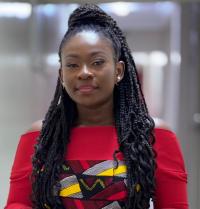
Emma Davies
M.A. student in Liberal Studies, North Carolina State University
Emma Davies is a second-year student in the MA in Liberal Studies program with concentration on communication, agriculture and genetic engineering at North Carolina State University. She earned her Bachelor of Arts in Communication Studies (Major in Journalism) from the Ghana Institute of Journalism. Emma is passionate about emerging technologies like bioengineered organisms, agriculture and communication. She likes to learn how such technologies can be deployed responsibly. Right now, her research focuses on how Ghanaian scientists communicate about genetically modified organisms, and how the Responsible Innovation framework could shape the adoption of genome-edited crops in Africa, looking at how it is portrayed as the solution to Africa’s lingering food insecurity. Through this work, she has discovered that the people for whom the crops are developed are not engaged, hence she hopes to encourage the participation of various stakeholders while ensuring that new innovations are context-specific.
Emma is also a fellow of the Genetic Engineering and Society Center at NC State University. She has been a journalist with the Multimedia Group Limited’s business desk since 2020, specializing in agriculture reportage. She shares the ideology that agriculture is the backbone of any economy, provided the right investments are made. She hopes that Africa’s agricultural sector will adapt to the growing digital economy as science is the game changer for development. Emma is a 2024 IFAJ/Alltech Young Global Leader. She is the 2022 Ghana Journalists Association Business/Economics Reporter of the Year and 2022 Aquaculture Journalist of the Year. In the future, she hopes to shape agricultural policies that would transform the food basket of minority communities.
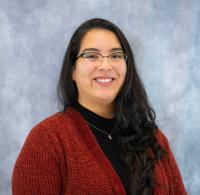
Jillian Munoz
M.S. student in Regenerative Studies, California State Polytechnic University, Pomona
Jillian Muñoz is a third-year master’s student and research assistant studying Regenerative Studies at the Lyle Center for Regenerative Studies at Cal Poly Pomona. She earned her B.A. in Industrial/Organizational Psychology with honors from the same university. Jillian is passionate about exploring the social, political, and economic contexts that promote agroecology, food sovereignty, and regional resilience. Currently, her research focuses on barriers to collaboration among agri-food advocacy groups and community food initiatives in Southern California. She is also engaged in another project that seeks to increase the visibility of urban/suburban backyard chicken keepers by demonstrating the diverse motivations behind their care practices for their flocks. Through these projects, she’s realized that the disparities between urban consumption and rural environmental degradation can be addressed with cultural inclusivity and community resilience.
Jillian has worked with the National Farm to School Network as a Communications Intern, promoting the policy work of the staff in accessible and engaging social media campaigns and newsletters. She’s also recently served as an Editorial Assistant for the Journal for Environmental Studies and Sciences. Jillian was a McNair Scholar, a Student Ethics and Policy Fellow, and received a research distinction award for her exceptional commitment to research and scholarship. In the near future, she hopes to continue her food systems research in a doctoral program. Her long-term goal is to facilitate collective action so community organizers, urban and rural food producers, and institutions can create sustainable and just food systems.
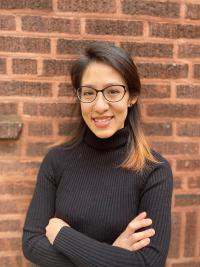
Maggie Acosta
Ph.D. student in Anthropology and Social Change, California Institute of Integral Studies
Maggie Acosta is a first year PhD student in Anthropology and Social Change at The California Institute of Integral Studies. She earned her master’s in social science with a concentration in medical anthropology from The University of Chicago. Maggie is passionate about merging research and community organizing towards food sovereignty. Right now, her research focuses on popular education with immigrant farmworkers. Through this work, she has also been rejuvenated to learn more about her ancestral Mayan culture from the Yucatan peninsula of Mexico. She is a gardener, ceramicist, seed keeper, and fiber artist- all of which are a part of her cultural preservation and activism.
Maggie is also the Assistant Director of the Great Lakes Center for Farmworker Health and Wellbeing where she simultaneously leads the Outreach Program. Her long-term goal is to leverage her own positionality as a first-generation Latina-Malaysian from a working class, immigrant background to conduct activist-research that contributes to the advancement of public health and social movement building among migrant and working-class groups.
Current Mentors
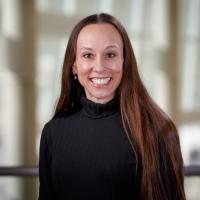
Athena Ramos
Associate Professor, University of Nebraska Medical Center

Kolia Souza
Project Director, Cornell University
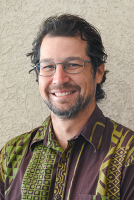
Noa Lincoln
Professor, University of Hawaiʻi at Mānoa
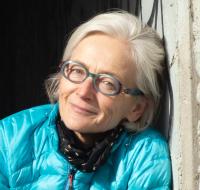
Mrill Ingram
Participatory Action Research Scientist, Michael Fields Agricultural Institute
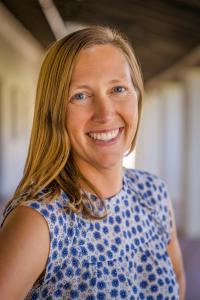
Rachael Soper
Associate Professor of Sociology, California State University - Channel Islands